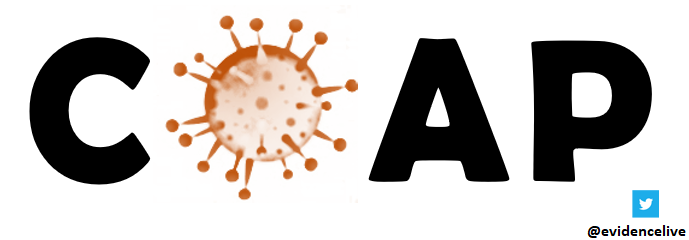 Living Evidence on COVID-19
Living Evidence on COVID-19
Welcome to COVID-19 Living Evidence. This database is updated daily with published articles from Pubmed, EMBASE and PsycINFO and with preprints from medRxiv and bioRxiv. We only include research about SARS-CoV-2 and COVID-19 (Details of our search).
Twitter: @evidencelive
The COAP database will not be updated after 28th February 2022. We recommend the World Health Organization (WHO) COVID-19 database as an alternative search engine. You can find information on how the databases differ here.
Twitter: @evidencelive
Searching within the SARS-CoV-2/COVID literature
This search application uses Structured Query Language (SQL) to select rows that match the keywords or terms. The keywords are translated to an SQL query. This allows all nested logic that is allowed in SQL. Searching is case-insensitive and please use the syntax described below.
Boolean logic
In the context of database searching, Boolean logic refers to the logical relationships among search terms. We used Nesting in order to be able to use multiple Boolean operators.
When using multiple Boolean operators, they are processed left to right (e.g. (ELISA) AND (antibody test) OR (blood)). This will retrieve records that include both terms 'ELISA' AND 'antibody test' as well as all records with the term 'blood', whether or not they contain the other two terms.
To change the order in which terms are processed, enclose the terms(s) in parentheses (e.g. (ELISA) AND ((antibody test) OR (blood))). This will retrieve records that contain the term 'ELISA', as well as one or both of the terms 'antibody test' OR 'blood'.
Please make sure that each keyword of a query is between brackets. If not, the system will read that query as one word and boolean operators will not have any functions (e.g. (ELISA AND antibody test OR blood)) is not correct.
Single Keyword
Searching for publications that contain only the word 'ELISA' is done by entering: ELISA. Brackets are not required in single keyword. For new variants (e.g.'B.1.1.7' please use brackets (B.1.1.7)).
Boolean Operators
The Boolean operators AND, OR, NOT can be used to combine search terms and nesting is allowed. Boolean operators are case-insensitive. Searching for publications that contain the word 'ELISA' OR 'antibody test' AND 'blood' is thus done by entering:
((ELISA) OR (antibody test) AND (blood))
(ELISA) OR (antibody test) AND (blood)
((ELISA) or (antibody test) and (blood))
(ELISA) or (antibody test) and (blood)
IMPORTANT: (ELISA OR antibody test and blood) is not correct.
Here are some examples for AND, OR Boolean operators:
(elisa) AND (antibody test) AND (blood) AND (patient)
(elisa) OR (antibody test) OR (blood) OR (patient)
(elisa AND ((test) OR (blood)))
elisa AND ((test) OR (blood))
(elisa or ((test) and (blood)))
Please be sure that NOT/not must precede immediately the keyword. NOT and Keyword should be in the same brackets. Multiple NOT is also supported
Here are some examples for NOT operator:
((ELISA) or (antibody) or (patient)) and (not blood)
((ELISA) or (antibody test) or (iron)) and (not protocols) and (not red blood cells)
(elisa or ((red blood cells) and (COVID-19))) and (not antibody test)
Truncation
Truncation is supported. System treats keywords as combinations of letters that need to appear in the text regardless of their position in the WORD.
This means that the keyword: ‘symptom’ will identify asymptomatic, symptoms, pre-symptomatic, etc. Another example, if you type (ELI) all words containing "eli" or "ELI" will be filtered (e.g. "Delivery", "ELISA", etc.)
Error message
Error message will show up when the syntax of the query is incorrect.
Title, abstract or both
Queries are run in the title and/or abstract field.
Study designs
We are currently rapidly screening citations based on study-design (more details here). However, this is still incomplete and we recommend always including the last row 'Unclassified' checked.
Download subset
Subsets according to search criteria can be downloaded using the buttons.
How to cite the COVID-19 Living Evidence database:
COVID-19 Open Access Project. (2021). Living Evidence on COVID-19. Retrieved from https://ispmbern.github.io/covid-19/living-review/
Download RIS citation